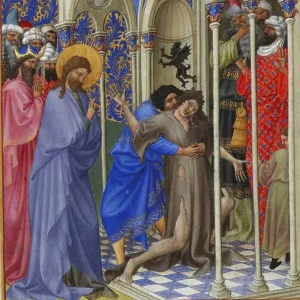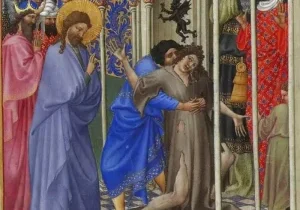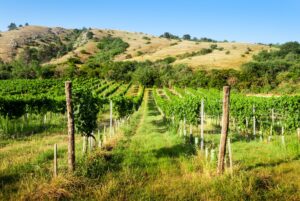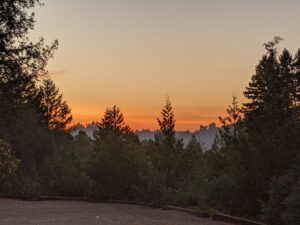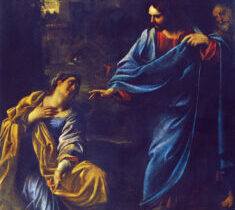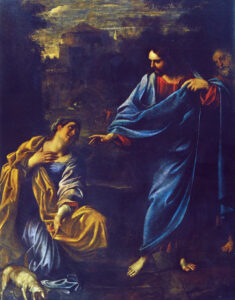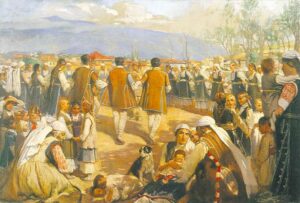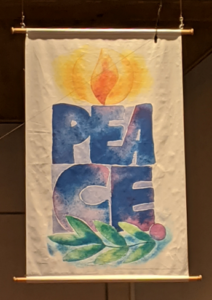 “I will rise and go to my father.” (Lk 15:18)
“I will rise and go to my father.” (Lk 15:18)
Have you ever had the experience of doing something that you know was wrong and were hoping no one would notice? Perhaps you were embarrassed about it. Perhaps you were afraid of punishment. Perhaps you feared that what you had done could never be forgiven. Maybe you were a child and hid in a closet or out in the back yard for as long as you could, rather than face the parent whose anger or disappointment you feared. Maybe you simply didn’t respond to the letter or phone calls of the friend whom you had hurt.
Rejoice. You’re not alone. I think we all have had this kind of experience at least once in our lives. The peoples of the Bible had these kinds of experiences too. You are not alone, and you don’t have to stay in that frightened, embarrassed place forever.
Moses and the Israelites
Shortly after the Exodus from Egypt, Moses received the Law from the Lord on Mt. Sinai and presented it to his people. Then Moses was called again to the mountain of the Lord. The book of Exodus devotes many chapters to the encounters of Moses with the Lord and the reception of the Law. This time when he went up the mountain, he again disappeared into the cloud at the top and did not return for many, many days – forty days in all! The people waiting at the foot of the mountain became afraid. What had happened to their leader, the one who faced Pharaoh, the one who led them across the Red Sea and through the desert? Had he died? They believed that anyone who saw the face of the Lord would die. Who would be their leader now? Who would be their representative to God? They had welcomed the proclamation of the Law from Moses and offered sacrifice to confirm their agreement to it before he left again. Why was he gone so long? Maybe what they needed was a god they could see and touch, like the ones of the peoples among whom they lived.
Aaron, brother of Moses, was approached by a group of them, asking him to help them find a god whom they could worship and who would protect them. Not knowing what had happened to his brother, Aaron ordered them to bring gold jewelry and coins. He melted them down and formed a calf from the gold. Calves were worshiped by many of the surrounding peoples as representations of their gods. The people rejoiced and began to worship the golden calf.
Up on the mountain, the Lord noticed what was happening and was not amused. “Go down at once to your people, whom you brought out of the land of Egypt, for they have become depraved.” (Ex 32:7-11, 13-14) The Lord was angry and proposed to Moses that he would simply destroy them all, then make a new nation for himself from the descendants of Moses. This would have been the right and just thing for a monarch or a god to do, according to the experience and traditions of the nations at that time, so that is the response ascribed to the Lord in this account.
However, Moses boldly spoke up and presented a different option, imploring, “Why, O Lord, should your wrath blaze up against your own people… Remember your servants Abraham, Isaac, and Israel” and the promise made to them. With this reminder, “the Lord relented in the punishment he had threatened to inflict on his people.”
Did that settle the issue forever? No. There was much more to the story, as Moses descended from the mountain, broke the tablets on which the Lord had written the Law, punished the people who had rebelled, and again returned to the mountain top for another forty days, so the tablets could again be inscribed with the Law. The relationship between the Israelites and God continued to be rocky through the centuries, but God always remained merciful. There were times when things went very badly for Israel and they interpreted the suffering that came to them as punishment for having offended God. But when once again peace returned and all was well, they rejoiced in the mercy of their God, who never left them.
The Psalms often speak of the loving mercy of God, asking God to wipe out our offenses, cleanse us of sin, and open our mouths to proclaim his praise. “A heart contrite and humbled, O God, you will not spurn.” (Ps 51)
St. Paul’s Experience
St. Paul also experienced mercy from the Lord. Paul was the Roman name of a pharisee named Saul who grew up in Tarsus. Tarsus was a Roman city in an area northwest of Syria. Saul was a Roman citizen because of his birth in Tarsus, but he was also a Jew. He had studied in Jerusalem and was greatly distressed by the teachings of Jesus’ disciples after the resurrection. When the authorities began to arrest Christians, Saul was totally in favor of wiping out this new, heretical group. In fact, he was a witness to the stoning of the first Christian martyr, Stephen. Those who were throwing the rocks at Stephen laid their cloaks at Saul’s feet for safekeeping as he looked on with approval.
Later, as the Christian community dispersed to other cities in the empire, Saul followed after them to Damascus, planning to arrest them, return them to Jerusalem, and witness their deaths. But the Lord had other plans for him.
On the road to Damascus, Jesus appeared to Saul. Saul was totally blown away by the appearance of Jesus. Jesus instructed him to continue his journey to Damascus. There he met members of the Christian community and became one of them. Thus began his long journey as a follower of Jesus and apostle to the Gentiles.
Many years after his conversion, Paul wrote to Timothy, one of the men who had been converted by Paul’s teachings and had become a companion on some of his missionary journeys. (1 Tim 1:12-17) Paul spoke of his experience of having received mercy from the Lord, despite his earlier attempts to wipe out Jesus’ followers. “I was mercifully treated, so that in me, as the foremost, Christ Jesus might display all his patience as an example for those who would come to believe in him for everlasting life.” It was through the mercy of God that Paul found a new meaning and way in life. A new kind of justice.
Jesus’ Stories of Forgiveness
Jesus embodied God’s approach to sinners. Sinners were anyone who did not live by Jewish Law and customs. As in any society, there are always folks who skirt the rules or refuse to follow them. Most people avoided contact with public sinners – tax collectors, prostitutes, thieves, and so forth. But Jesus went out of his way to speak with them. This brought constant criticism from the religious authorities. “This man welcomes sinners and eats with them.” Eating with someone who was a sinner, who was ritually unclean, made a person also ritually unclean. It was a big deal.
In response to the criticism, Jesus told three stories. (Lk 15:1-32) The first was about a shepherd who had one hundred sheep. One of them got lost. The shepherd left the ninety-nine and went in search of the missing one. When he found it, he returned to the rest of the flock and called his friends to celebrate with him because he had found the missing sheep. Jesus told his audience that in heaven, there will be much greater joy over the repentance of a sinner than over those who have always lived righteously. Like his listeners, we might wonder about the wisdom of leaving ninety-nine sheep to fend for themselves. In practical terms, unless others were watching out for the flock, the rest of the sheep would probably be gone by the time the shepherd returned with the stray. But Jesus takes it for granted that a true shepherd would care about the missing one too.
Another example of God’s extravagance is that of the woman who had ten coins. When she lost one, she lit a lamp and cleaned the house carefully, looking for the coin. When she found it, she called her friends and neighbors to celebrate with her because the coin had been found. Having recently found a coin that I had dropped and been unable to find for several days, I can appreciate her delight. For me the coin was not a huge issue, but I had been wondering where it had managed to hide when I dropped it. For her, the coin was much more important. Important enough to burn expensive oil in the effort to find it. Jesus explained again that the angels rejoice when each sinner repents. The cost doesn’t matter to God and the angels rejoice.
The final story is one we often know as that of the Prodigal Son. It might also be called the story of the Extravagantly Merciful, Welcoming Father. A son requests his share of the family wealth, takes the money and spends it all on wild living. Then he finds himself without resources in a foreign land as drought and famine rage. Eventually he comes to his senses and declares, “I will rise and go to my father…” The son intends to ask for a job as a servant in the household, but his father, seeing him coming down the road, runs out to welcome him. He treats him as a much-loved son and restores his position in the household. A great celebration then begins, with no expense spared, to welcome the son back to the family.
The brother who had remained with his father is very hurt and angry at the way his father treats the one who had gone away and wasted the family resources. He refuses to enter the house and join the celebration, considering his father’s actions to be unfair. But the father of both young men explains, “now we must celebrate and rejoice, because your brother was dead and has come to life again.”
Like the Extravagantly Merciful, Welcoming Father in the story, we are loved and welcomed by our God, who is a parent to us. Sometimes we really make wrong choices. Sometimes we deliberately do what we know is wrong. Sometimes we don’t do what we know we should do. Like the Israelites in the desert, or Saul on the road to Damascus, or the young man who went off and spent his share of the family money, our actions can be very wrong. Yet God does not punish us. God doesn’t interfere with our free choice to turn away. But God always wants us to return, not to be afraid to come back. The circle of love is always open to receive us again. We just have to turn back and accept the big hug that God wants to give us. The justice of God is not something to be feared. The justice of God is extravagant mercy and love. Today, tomorrow, and always.
Thanks be to God!
Find the readings for the Twenty-fourth Sunday in Ordinary Time – Cycle C
Read More
